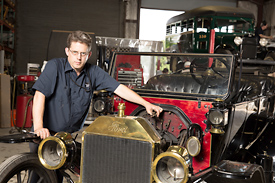In a world where steam locomotive whistles rise and fall amidst the sound of tolling bells and horseshoes clomping on pavement, Patrick Drone waits behind the wheel of a clattering Model T.
He smiles at people strolling by. They smile back, as they promenade along a pleasant village lane.

Photo by Eric Bronson, Michigan Photography.
It’s another day on Drone’s summer job as a Greenfield Village mechanic. In a sense, it’s comparable to what he does during his 36-week U-M appointment August through April.
That’s because Drone in his position as theatrical properties master at U-M provides the backdrop that brings authenticity to stage performances. At The Henry Ford’s Greenfield Village in Dearborn, he also supports a historic period presentation, by helping to maintain nearly 40 Ford Model T and Model A autos.
“The similarities between the theatrical world and the village are very close. In the village, all our service vehicles have to be period correct. We use Model A trucks for food services and to supply special programs. Here, they have their own period clothing like we do at University Productions and a costume shop,” Drone says.
The Carmi, Ill., native got started in stage production as a road technician for an opera company based in Portsmouth, Va. “We built sets, and did a lot of set rentals,” he says. Drone met his wife Kerry Jahn at the company. Married in 2005, they have two children ages 1 and 3.
That also was the year the couple moved to Ypsilanti, as Drone began working as a properties artist for U-M University Productions, which supports the School of Music, Theatre & Dance. He was hired to do carpentry, building a range of furniture to appear on sets ranging from couches and chairs to fake pianos.
Drone’s favorite project involved a small town saloon setting he created for the 2012 production of “Crazy for You.” It included a replica stuffed possum — an actual toy possum he found on Amazon.com for $8 — and moose antlers mounted on a wall, above a player piano.
“During the show some (simulated) gunfire goes off. It hits the stuffed possum, which hits the moose antlers, which hit the piano, which starts playing on its own,” Drone explains. Then, an actor walks up and kicks the piano, which resets the parts to their original positions — all as part of the scene. Drone rigged pneumatic cylinders to make it all happen.
Drone maintains a computer database to coordinate theatrical properties for the 10 annual Mainstage and student-run Basement Arts productions, and senior directing projects. “If a designer wants some scenery or a property, we have to make sure they’re not available for another production,” he says.
Providing stage furniture and scenery also involves sometimes tricky coordination of vehicles and manpower. “Some shows end at 5 p.m. and we need to get properties to another show that starts at 7,” Drone explains.
He first came in contact with The Henry Ford in 2008 when a supervisor told him of a summer painting job there. “I was doing prep work for a U-M production of “Ragtime” which we needed a Model T for, so when The Henry Ford brought me in, I got to chatting with the director of facilities,” he says. Because Drone had significant mechanic experience, he was hired as a seasonal employee with the Antique Vehicle Garage.
Despite serious technological advancements, some elements of auto maintenance are constant. “The internal combustion engine has been around since the 1890s and before. We make incremental changes to it but in many ways it’s the same,” Drone says. He says an auto mechanic basically learns to understand the relationship of the different pieces and parts, and to break down the system into its individual segments.
“It’s like the possum gag the way the pieces work together — it fascinates me,” Drone says.
The weekly Spotlight features faculty and staff members at the university. To nominate a candidate, please contact the Record staff at [email protected].

